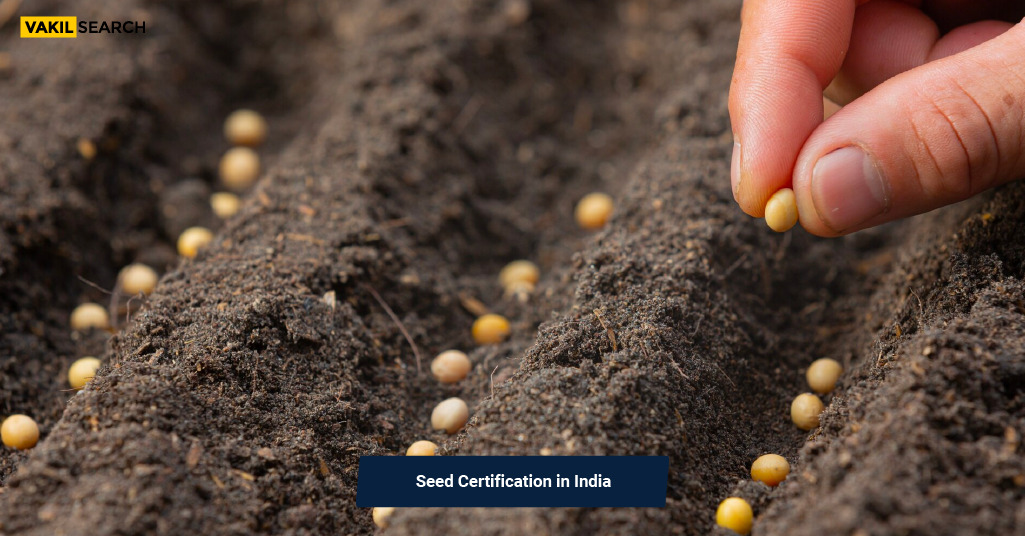Ensuring pure crops and bountiful harvests: Explore Seed Certification in India, a system safeguarding quality and boosting yields.
Seed Certification – Overview
Seed certification is a crucial system in India that ensures the production and distribution of high-quality seeds for various crops. This system plays a vital role in:
- Enhancing crop yields and productivity by ensuring seeds possess the desired genetic makeup and germination potential.
- We are maintaining the genetic purity of seed varieties, preventing unwanted cross-pollination and preserving desirable traits.
- Implementing effective quality control throughout the seed production process, from field inspections to post-harvest storage and treatment.
- Seed multiplication: Certified seed is produced through controlled multiplication from breeder and foundation seed, ensuring genetic traceability.
- Variety verification: Field inspections and lab tests confirm the seed variety matches the intended type, preventing mislabeling and ensuring genetic purity.
- Germination rate: Seeds undergo rigorous testing to determine their germination potential, guaranteeing successful crop establishment.
- Seed treatment: Certified seeds may receive appropriate treatments like fungicides or insecticides to protect against diseases and pests.
- Seed labelling: Certified seeds are packaged with clear labelling indicating variety, germination rate, and other relevant information.
Seed production practices under the certification program adhere to strict guidelines covering factors like:
- Field isolation distances to prevent cross-pollination with unwanted varieties.
- Proper crop management practices, including irrigation, fertilization, and pest control.
- Harvesting and storage methods that ensure seed quality and viability.
Seed certification agencies in each state play a crucial role in overseeing the entire process. These agencies are responsible for:
- Developing and implementing certification standards specific to different crops and regions.
- Inspecting seed production fields and conducting quality control tests.
- Issuing seed certification tags and labels to ensure authenticity.
Eligibility Creteria:
To be eligible for certification in India, your seed production program must meet specific criteria set by the Indian Seed Act (1966) and Seed Rules (1968). Here are the key requirements:
- Notified Kind and Variety: The crop and variety you plan to produce must be officially notified by the Government of India. This ensures adherence to specific quality standards and avoids genetic contamination.
- List of Notified Kind and Varieties of Seeds by Government of India
- Source of Seed: The initial sowing material (breeder seed or foundation seed) must be obtained from authorized sources like Seed Certification Agencies or research institutions.
- Land and Water Resources: Your land and water resources must be suitable for producing certified seeds meeting specific geographical, irrigation, and soil quality requirements.
- Technical Competence: You must possess or hire the necessary technical skills and knowledge for proper seed production practices and adhering to certification standards.
- Infrastructure and Equipment: Adequate infrastructure and equipment are crucial for seed processing, storage, and handling to maintain seed quality.
- Compliance with Regulations: You must comply with all the regulations and guidelines outlined by the Seed Certification Agency in your state.
Meeting these eligibility criteria is essential for entering the seed certification program and ensuring your seed production program adheres to the highest quality standards.
Purpose and Benefits:
The certification offers numerous benefits for various stakeholders in the agricultural sector:
For Farmers:
- Increased Crop Yields: Certified seeds have higher germination rates and genetic purity, leading to better crop establishment, growth, and, ultimately, higher yields.
- Improved Market Access: Certified seeds fetch higher market prices due to their guaranteed quality and reliability, contributing to increased farmer income.
- Reduced Risk of Seed-borne Diseases: Seed treatments and quality control processes minimize the risk of seed-borne diseases, leading to healthier crops and reduced losses.
- Access to Advanced Genetics: The certification promotes the dissemination of improved and high-yielding varieties, enhancing farm productivity and adaptability.
For Consumers:
- Quality and Safety: Certified seeds ensure consistent quality, taste, and nutritional value of agricultural produce, improving food safety and security.
- Sustainability: The responsible production practices associated with certification promote sustainable agriculture and environmental protection.
- Traceability and Transparency: Seed labelling and certification provide traceability throughout the supply chain, building trust and consumer confidence.
For the Nation:
- Food Security: Increased agricultural productivity through certified seeds contributes to national food security, ensuring adequate food availability for the population.
- Economic Growth: A thriving seed sector with high-quality seeds fuels agricultural growth and contributes to overall economic development.
- Export Potential: Certified seeds meet international quality standards, opening doors for increased agricultural exports and boosting the national economy.
Seed certification plays a crucial role in enhancing agricultural productivity, farmer income, and national food security in India by ensuring reliable and high-quality seeds.
Steps Involved in Seed Certification:
The certification process in India is a comprehensive and multifaceted program, broadly involving these key steps:
- Program Registration: Submit an application to the relevant Certification Agency outlining your seed production program details, including crop, variety, source of seed, and production area.
- Field Inspections: It Agency officials conduct regular field inspections throughout the growing season to assess crop health, adherence to production practices, and compliance with regulations.
- Seed Sampling and Testing: Seed samples are collected at different stages of production and undergo rigorous testing in laboratories to ensure germination rate, purity, genetic identity, and freedom from disease.
- Seed Processing and Treatment: Seeds undergo processing like cleaning, grading, and treatment with fungicides or insecticides, if necessary, to improve viability and protect against diseases and pests.
- Seed Packing and Labeling: Certified seeds are packed in standard bags with labels featuring essential information like variety, germination rate, lot number, and certification marks.
- Seed Release and Marketing: Certification Agencies issue a certificate authorizing the sale and distribution of certified seeds, allowing them to be marketed with a recognized symbol of quality.
Following these steps ensures that only high-quality seeds meeting stringent standards reach the market, fostering trust and confidence within the agricultural ecosystem.
Validity of Seed Certification in India:
The validity period of certification in India is nine months from the date of testing at the time of initial certification. However, this can be extended for an additional six months under certain conditions:
- Retesting: The seed must be retested and confirmed to meet the prescribed standards for germination, physical purity, and insect damage (except for vegetatively propagating material, which will require field re-examination).
- Storage: The seed must be stored under proper conditions to maintain its quality throughout the extended validity period.
- Agency Approval: The Certification Agency must approve the validity extension based on the testing results and storage conditions.
It’s important to note that seed validity doesn’t guarantee viability throughout the extended period. Factors like storage conditions, temperature, and humidity can still affect seed quality. Always check the germination rate before sowing seeds, regardless of their certification validity.
History of Seed Certification in India:
The journey of certification in India began in the 1950s, driven by the need to improve agricultural productivity and ensure quality seed supply. Here are some key milestones:
- 1956: The Indian Council of Agricultural Research (ICAR) established the Central Seed Testing Laboratory to analyze and certify seed quality.
- 1961: The Indian Seed Act was introduced, laying the legal framework for certification and quality control.
- 1968: The Seed Rules were formulated, outlining detailed procedures and standards for certification across different crops.
- 1972: The National Seeds Corporation (NSC) was established to manage and promote the production and distribution of certified seeds.
- 1983: The Central Seed Certification Board (CSCB) was set up to harmonize and monitor seed certification activities across various states.
- Present: Today, certification in India is overseen by a network of State Seed Certification Agencies (SSCAs) under the guidance of the CSCB.
Seed Certification Agencies:
Each state in India has its own State Seed Certification Agency (SSCA) responsible for implementing the certification of seed programs within its jurisdiction. Here are some examples:
- Tamil Nadu Seed Certification Agency (TSCSC)
- Maharashtra Seed Certification Agency (MSCA)
- Karnataka State Seed Certification Agency (KSCA)
These agencies offer various services to seed producers, including:
- Guiding seed production practices and certification requirements.
- Conducting field inspections and seed testing.
- Issuing the certification of seed certificates.
- Maintaining records of certified seed production and distribution.
Farmers and seed producers can contact their local SSCA for assistance and information related to the certification of seed in their respective states.
By understanding the validity, history, and agencies involved in the certification of seed, stakeholders in the Indian agricultural sector can contribute to a stronger and more sustainable food system.
Phases of Seed Certification in India:
The certification of seeds in India is a rigorous process ensuring the quality and genetic purity of seeds reaching farmers. It involves several key phases:
Application and Verification:
- The seed producer submits an application to the State Seed Certification Agency (SSCA) with details about the crop, variety, source of seed, and production area.
- The SSCA verifies the eligibility of the program based on the notified kind and variety, source of seed, land and water resources, technical competence, infrastructure, and compliance with regulations.
Field Inspections:
- Throughout the growing season, SSCA officials conduct regular field inspections to assess crop health, adherence to production practices, and compliance with regulations.
- This ensures isolation distances from other varieties, proper plant population, pest and disease control measures, and overall field management practices.
Seed Sampling and Testing:
- Seed samples are collected at different stages, including pre-harvest, harvest, and after-processing.
- These samples undergo rigorous testing in laboratories for germination rate, physical purity (freedom from other seeds and weed seeds), genetic purity (ensuring varietal identity), moisture content, and seed-borne diseases.
Seed Processing and Treatment:
- After harvest, seeds are cleaned, graded, and dried to optimal moisture content.
- Depending on the crop and variety, seeds may undergo seed treatment with fungicides or insecticides to protect against diseases and pests.
Seed Packing and Labeling:
- Certified seeds are packed in standard bags with specific labelling requirements.
- Labels must include a variety of names, germination rates, lot numbers, date of testing, certification mark, and any special treatment information.
Seed Release and Marketing:
- Upon successful completion of all stages, the SSCA issues a certificate authorizing the sale and distribution of certified seeds.
- Seed producers can then market their certified seeds with the recognized symbol of quality, assuring farmers of reliable and high-performing seeds.
Conclusion:
The certification plays a crucial role in India’s agricultural sector by:
- Ensuring high-quality and genetically pure seeds for farmers.
- Boosting crop yields and food security.
- Improving farmer income through better market access.
- Promoting sustainable agricultural practices.
By understanding the phases involved in certification, farmers, seed producers, and consumers can all contribute to a stronger and more resilient agricultural system in India.
Read more:-









